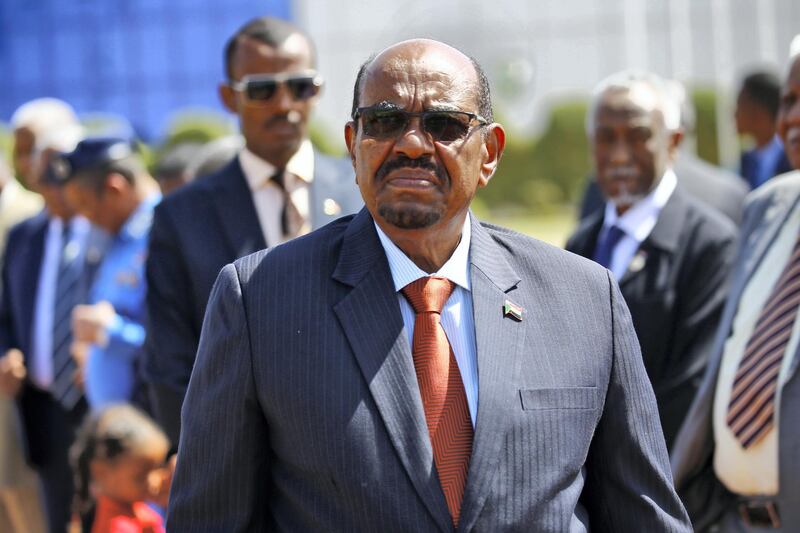For many Americans, Sudan is at worst known for providing a safe haven for Osama bin Laden and the genocide in Darfur and at best, for being the world’s largest gum arabic producer.
For the US government, however, and since Barack Obama’s quiet engagement with Khartoum in 2015, the country represents an opportunity for military, intelligence, and economic cooperation.
Last month, the Trump administration lifted a 20-year-old sanctions regime on Sudan, continuing in the footsteps of the Obama White House, which loosened those sanctions one week before leaving office in January.
The improved US-Sudan relations could eventually lead to the removal of Sudan from the list of state sponsors of terror, experts told The National.
The détente is taking place in parallel to Khartoum’s regional realignment away from Iran and closer to the Arab world.
This month saw a peak in the US thaw in relations with Sudan. Weeks after lifting the sanctions, Khartoum announced on November 17 that it’s severing all trade and military ties with North Korea, a key demand by Washington that was negotiated during a visit to Sudan that same week by US deputy secretary of state John Sullivan.
In a speech from Khartoum, Mr Sullivan presented a path for Sudan to become a “full partner” by improving its human rights record, and seeking “peace within its borders and with its neighbours”.
On Sudan’s state sponsor of terror listing, a status it gained in 1993, Mr Sullivan said: "We are prepared to continue discussions with the government of Sudan on this issue, and to engage with them on all that would be required to have them removed from the list of state sponsors of terrorism.”
In March, the US and Sudan resumed military relations ahead of the US Central Intelligence Agency (CIA) decision to open an office there a month later. Then in September, an amended version of Mr Trump’s travel ban removed Sudan from the list of countries facing immigration restrictions to the US.
Kelsey Lilley an associate director of the Africa Center at the Atlantic Council in Washington told The National that the new US-Sudan openness is transactional in nature and is based on a quiet process that Mr Obama started with Khartoum a year before leaving office.
“It was very smart and purposeful by the Trump administration to take the baton [from the Obama team], to continue and own the engagement process with Sudan,” Ms Lilley said. According to the US State Department, Washington’s engagement with Khartoum is based on a five-track plan, which includes ceasing hostilities in conflict regions, improving humanitarian access throughout Sudan and refraining from interference in South Sudan. The US also wants more cooperation to counter the Lord’s Resistance Army rebel group operating across several African countries and building cooperation on counter terrorism.
Steve McDonald, a global fellow at the Woodrow Wilson centre, said the US should temper its expectations of such openness from Sudan president Omar Bashir, who is accused by the ICC of genocide and war crimes in the Darfur conflict.
“Bashir is still under International Criminal Court indictment and the government continuing to close democratic space, human rights violations still persist in the Blue Nile, South Kordofan, and Darfur,” Mr McDonald warned. He added that it remains to be seen if Sudan stops arming the Sudan People's Liberation Movement-in-Opposition in South Sudan fighting.
Still, Ms Lilley stressed that the US-Sudan thaw is not about resolving every issue but is rather “a recognition that engagement achieves results, whereas decades of sanctions and economic and cultural isolation didn’t achieve much”.
Besides the economic opportunities that Sudan presents the United States across North and Central Africa and particularly in rivalling China in the continent, the country’s geopolitical shifts away from Iran and North Korea have been also welcomed by Washington.
In 2014, Sudan expelled Iranian diplomats before cutting all its relations with Tehran in 2016. In parallel, Khartoum improved its ties with Saudi Arabia and GCC countries, sending soldiers to Yemen in 2015 and receiving a $1 billion (Dh3.67bn) deposit in return. Just in 2017, Mr Bashir has visited Saudi Arabia four times where he met either King Salman or Crown Prince Mohammed bin Salman or both.
“The attempt by the Trump administration to align powers in the Middle East and North Africa against Iran plays into this [engagement], with Sudan agreeing to break ties with Iran and come closer to Saudi Arabia,” said Mr McDonald.
Washington praised Khartoum, after severing its ties with North Korea this month.
“Isolating the North Korean regime is a top priority for the United States, and is a key element to maintaining peace and stability worldwide,” the state department said. “The United States is grateful for Sudan’s commitment to take these important steps in light of the critical threat posed by the DPRK”
Pressuring Sudan on geopolitical alignments also shows that "there is no place that the US government will not pursue [in isolating] North Korea—whether in Africa or elsewhere globally" said Ms Lilley.
While Mr McDonald warns that Mr Bashir “can not be trusted” and “US may be bound for a very rocky road ahead”, Ms Lilley applauds a continuation of a calculated transactional engagement by Washington toward Khartoum.
Issues of debt relief, removal from state sponsor of terror could be next on the table in return for more constructive counterterrorism and regional peaceful gestures from Sudan.







